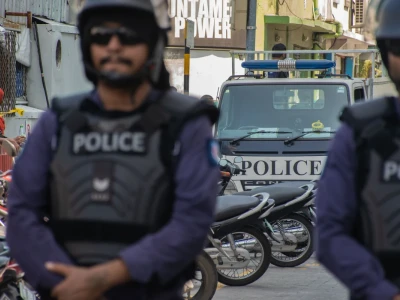
Tagging of high-profile suspects begin with Ahmed Ismail
Imran hopes there will be a change in the society that people will see, and warn the people who commit serious crimes.
Top Stories
By
Fathmath Ahmed Shareef
Law enforcement agencies have begun affixing electronic ankle tags to track the movements of people accused of serious crimes, with the first device affixed to Ahmed Ismail, who is charged in connection with the murders of journalist Ahmed Rilwan and blogger Yameen Rasheed.
Three people were arrested on June 26, 2022 and charged on September 1, 2022 in connection with the disappearance of Minivan newspaper journalist Rilwan and the murder of blogger Yameen. The three men and the charges against them are:
-
1-
Ahmed Ismail, MA. Faagafilaage/Male, 39 - Aiding and abetting an act of terrorism
-
2-
Ismail Abdul Raheem Adam, M. Lagoon-view, 30 - two counts of aiding and abetting an act of terrorism
-
3-
Ahmed Muaz, Male Dhaftharu No. 8499, 40 - conspiracy to commit an act of terrorism
Although the three men were remanded till the end of their trial, Criminal Court granted a conditional release to Ahmed Ismail on Tuesday.
Home minister Imran Abdulla announced on Friday the re-introduction of electronic tagging of high profile suspects.
Atoll Times has learned that:
-
The first person to be tagged was Ahmed Ismail
-
He remains the only person to be tagged
'Aim is to reduce prison incarceration'
Announcing the re-introduction of electronic tagging, Imran tweeted that police have the ability to monitor and control people for criminal justice purposes and started using ankle bracelets under a court order on Friday.
A monitoring and control (Monicon) system detects the movements of people accused of serious crimes using a tag.
It is to determine the activities of those whom the court determines should not be detained until the end of the trial because there is not enough evidence to keep them arrested.
Though the system with modern facilities is being used mainly under the Prevention of Terrorism Act, Imran said the government aims to introduce more procedures in the justice system to use 'Monicon' and reduce the number of people being held in jails.
Imran had earlier said that he was in discussions with the Attorney General's (AG) office to amend the legal framework to allow tags to be affixed even if the Monicon order was not issued. He said last year that the structure would be revised and tagging would be re-introduced this year.
Imran said that by starting to tag criminals in that way, there will be a change in the society that people will see, and hopefully serve as a warning to people who commit serious crimes.
Under the law, a person can only be tagged on a High Court order at the request of the home minister.
Recipients of the Monicon order are restricted in the following ways:
-
They are prohibited from leaving their homes or going to certain areas at certain times
-
If ordered by the police, the information of others in the residence of the person to whom the order is addressed, must also be given to the police
-
They cannot leave the city without the permission of the minister
-
The police have the power to control the person's financial and communication transactions and property
-
The tag can be attached to their bodies or where they live




